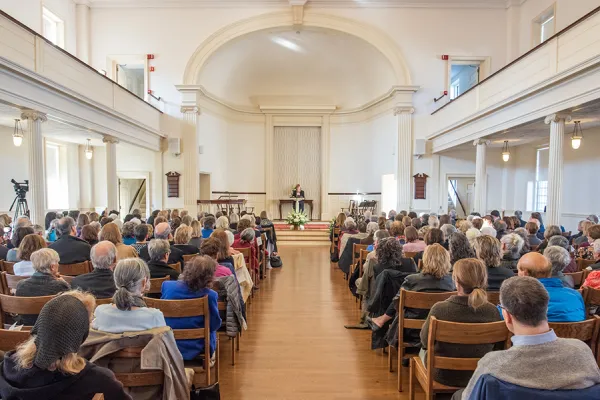Remembering Jill Ker Conway
Campus Life

Published October 19, 2018
Smith alumnae, faculty, staff and friends filled Helen Hills Hills Chapel on October 18 to celebrate the life of Jill Ker Conway, Smith’s seventh president.
An acclaimed scholar and author who was the first woman to lead Smith, Conway died on June 1 at her home in Boston. She was 83.
Smith College President Kathleen McCartney remembered Conway as someone who wanted to make the college, in her own words, “‘an avowedly feminist institution.’
“Jill saw Smith as a four-year disruption of unquestioned patriarchy,” McCartney said. “In writing about her own ambition, her own quest for power, and her own risk taking, Jill modeled leadership for women as necessary for modern feminism.”
In an afternoon filled with poetry and music, speakers recalled Conway’s passionate leadership, her commitment to women, and the doors that she opened for those who came after her.
Mary “Pat” McPherson ’57, a former chair of Smith’s Board of Trustees, became president of Bryn Mawr College in 1978, during Conway’s Smith presidency. “That was the first time that all of the Seven Sisters colleges had female presidents,” she recalled.
It was a challenging period for women’s colleges, as a number of traditionally male colleges and universities were becoming coeducational. “Many of Smith’s faculty were not as pleased as the alumnae with the selection of a woman president,” McPherson said. “I was so impressed by Jill’s righting of Smith’s sense of itself,” she said, noting especially the reshaping of the curriculum to include gender and women’s studies.
Smith President Emerita Carol Christ—now chancellor at the University of California, Berkeley—said Conway met the challenges of her era “not only through creative programming, but by asserting Smith’s centrality to the national conversation about women by virtue of the fact that it was a women’s college.”
Donna Divine recalled the transformative effect Conway had on Smith’s faculty and curriculum. In rousing remarks, the Morningstar Family Professor Emerita of Jewish Studies and Professor Emerita of Government said, “We urged caution; Jill insisted on audacity. In effect, she told us to get out of our academic closets and engage in the kind of research we knew was important. Teach about women. Talk about the poor, the marginalized, people of color. Ask questions that have never before been posed.
“In our classes and in our research, we left no cutting edge smooth—nor unexamined and uncontested,” Divine said.
Susan Bourque, the Esther Booth Wiley 1934 Professor Emerita of Government, also praised Conway’s revolutionary perspective. “Whenever I heard her teach or lecture, I felt I should buckle my safety belt,” Bourque said.
Conway’s impact was not just institutional—it was also personal. Smith trustee Camille O’Bryant ’83, S.M. ’86 was one of many inspiring women who recalled how Conway inspired her—in part by helping her through a financial challenge near the end of her senior year. “She lived a life of purpose, and she created pathways for so many,” O’Bryant said.
The Rev. Katharine T. Baker-Carr ’84 recalled the abiding love that Conway and her late husband, John, shared for each other—and for their home in Conway. “I hope you’re dancing happily with John, wherever you are,” said former trustee Sharmila “Mona” Sinha ’88.
Board of Trustees Chair Deborah Duncan ’77 closed the ceremony by remembering how important Conway’s leadership was to those who were students during her presidency. “She was an inspiration to all of us—maybe even more than faculty and alumnae,” Duncan said, “because she showed us that a woman really could be a leader—and a leader of an institution like Smith. She was a champion for women, and she showed us that there should be nothing that would get in our way.”